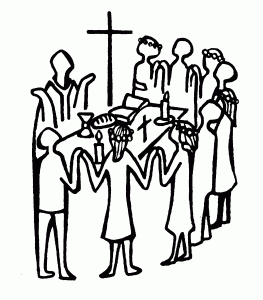 Anyone who cares to examine the church at large knows that we have for some time now been inundated with “Me and Jesus” Christianity.  Yes a Christianity divorced from anyone and anything else. Christianity divorced from the church and divorced from any shared confession of the faith. “Me and Jesus do faith our way. Well, really my way. I never really asked Jesus. But for me, this is great.”
Anyone who cares to examine the church at large knows that we have for some time now been inundated with “Me and Jesus” Christianity.  Yes a Christianity divorced from anyone and anything else. Christianity divorced from the church and divorced from any shared confession of the faith. “Me and Jesus do faith our way. Well, really my way. I never really asked Jesus. But for me, this is great.”
And for a long time, much of the clergy has rooted this on. The whole “relationship not religion” movement may have been started as a legitimate rebuke of lip worship (Isaiah 29:13) devoid of true fear, love, and trust, but it degenerated quickly into a highly individualistic view of relationship to God. Vain religion was in the minds of most paired with the idea of the Church as a whole. If people were still going to interact with the church on earth, it would be on their terms. Clergy continued to shift and provide churches formed by their people rather than being the Church which by its nature forms the people. For a while, enough people thought enough alike that churches could work in this way just by centering in on a demographic. But as people’s beliefs became more divergent, the possibility of creating a church that would match the desires of enough people to maintain a church become less and less. So then we went to a la carte churches which just tried to offer anything, and let people come in and out as they wanted.
And now many are sitting back and wondering why all the pews are empty. Why? Because most people think their relationship to Jesus has nothing to do with the Church or her marks (Word and Sacrament). “Me and Jesus” have no need of that. And they learned most of this from those now staring at the emptiness before them.
 How do we get back to a communal understanding of the faith that is so thoroughly scriptural? Did someone say communion?   Well, close enough.  Yes, it should be no surprise that the rise of individualism and the underemphasis of the sacraments (or at least their misinterpretation as private acts) ran parallel to each other. Yes we could increase the community feeling through trust falls and forced conversational intimacy. But I would suggest the real answer is to practice and preach the sacraments with much emphasis on their corporate nature. Baptism as incorporation into the body (Ephesians 4:4-5; 1 Corinthians 1; 1Corinthians 12:13; Galatians 3:27-28) and Eucharist as common meal of the baptized (1 Corinthians 10-11). From there might flow trust falls and real conversational intimacy. Emphasizing the sacraments reminds people that having a relationship with God necessarily means a relationship with the church and its members. And if properly preached this is not word of law requiring people to be there with the others, but word of gospel explaining the blessedness of life together.
How do we get back to a communal understanding of the faith that is so thoroughly scriptural? Did someone say communion?   Well, close enough.  Yes, it should be no surprise that the rise of individualism and the underemphasis of the sacraments (or at least their misinterpretation as private acts) ran parallel to each other. Yes we could increase the community feeling through trust falls and forced conversational intimacy. But I would suggest the real answer is to practice and preach the sacraments with much emphasis on their corporate nature. Baptism as incorporation into the body (Ephesians 4:4-5; 1 Corinthians 1; 1Corinthians 12:13; Galatians 3:27-28) and Eucharist as common meal of the baptized (1 Corinthians 10-11). From there might flow trust falls and real conversational intimacy. Emphasizing the sacraments reminds people that having a relationship with God necessarily means a relationship with the church and its members. And if properly preached this is not word of law requiring people to be there with the others, but word of gospel explaining the blessedness of life together.
Psalm 133: Behold, how good and pleasant it is when brothers dwell in unity! It is like the precious oil on the head, running down on the beard, on the beard of Aaron, running down on the collar of his robes! It is like the dew of Hermon, which falls on the mountains of Zion! For there the LORD has commanded the blessing, life forevermore.

Yes!!!! Right on target.
I posted this on Immanuel’s facebook.